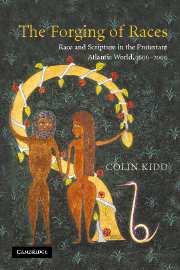Book contents
- Frontmatter
- Contents
- Acknowledgements
- 1 Prologue: Race in the Eye of the Beholder
- 2 Introduction: Race as Scripture Problem
- 3 Race and Religious Orthodoxy in the Early Modern Era
- 4 Race, the Enlightenment and the Authority of Scripture
- 5 Monogenesis, Slavery and the Nineteenth-Century Crisis of Faith
- 6 The Aryan Moment: Racialising Religion in the Nineteenth Century
- 7 Forms of Racialised Religion
- 8 Black Counter-Theologies
- 9 Conclusion
- Notes
- Index
5 - Monogenesis, Slavery and the Nineteenth-Century Crisis of Faith
Published online by Cambridge University Press: 05 June 2012
- Frontmatter
- Contents
- Acknowledgements
- 1 Prologue: Race in the Eye of the Beholder
- 2 Introduction: Race as Scripture Problem
- 3 Race and Religious Orthodoxy in the Early Modern Era
- 4 Race, the Enlightenment and the Authority of Scripture
- 5 Monogenesis, Slavery and the Nineteenth-Century Crisis of Faith
- 6 The Aryan Moment: Racialising Religion in the Nineteenth Century
- 7 Forms of Racialised Religion
- 8 Black Counter-Theologies
- 9 Conclusion
- Notes
- Index
Summary
In the nineteenth century, race became a dominant theme in western intellectual life. Not only did it become an organising concept in fields such as biology and anthropology, but ethnic differences also acquired a novel salience in fields such as history. Whereas hitherto the emphasis of history had been upon artificial groups such as empires, states and nations, now a scientific understanding of race seemed to promise a more authentic narrative based upon the facts of nature, the biological differences that existed between racial units. Racialist interpretations also became common in other areas of the humanities. Moreover, the accelerating commercial and industrial progress of the white peoples of Europe and North America and the spread of white-on-black imperialism throughout the world seemed to offer empirical vindication to the insights of racial science. Racial science – begotten, of course, in the white man's professions and universities – seemed to provide a compelling explanation of the world and the white man's place in it. Viewed from this perspective, the Victorian era reeks of a suffocating and bigoted complacency, and, no doubt, many white imperialists existed in a fug of self-righteous superiority.
However, for the intelligentsia which did so much to pioneer the science of race and to incorporate racialist perspectives into the outlook of the West, matters were not so straightforward. To the white intelligentsia of the nineteenth-century Atlantic world, race was not simply a matter of power relations.
- Type
- Chapter
- Information
- The Forging of RacesRace and Scripture in the Protestant Atlantic World, 1600–2000, pp. 121 - 167Publisher: Cambridge University PressPrint publication year: 2006
- 2
- Cited by



